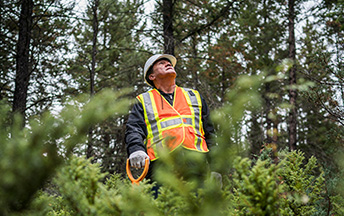Respecting human rights
Our approach to human rights
Human rights are fundamental to Shell’s core values of honesty, integrity and respect for people. Respect for human rights is embedded in the Shell General Business Principles and our Code of Conduct. Our approach is informed by the UN Guiding Principles on Business and Human Rights.
We work closely with other companies and organisations to improve how we apply these UN guiding principles. We focus on four priority areas where respect for human rights is critical to how we operate: communities, security, labour rights and supply chains.
In 2021 and 2022, we reviewed our salient human rights issues with the support of Business for Social Responsibility (salient human rights are those that are most at risk from our operations). We assessed potential impacts on the human rights of our stakeholders according to their potential severity, following the widely used criteria of scale, scope and irremediability. The resulting list of our salient issues is grouped into four focus areas: labour rights, supply chains, communities and security.
For each of these areas, we have systems to identify potential impacts and to avoid and mitigate them. For example, Shell’s HSSE & SP Control Framework contains requirements that set out how we identify, assess and manage our impacts on communities where we operate, including any impact on human rights.
The Shell Supplier Principles outline how we expect our contractors and suppliers to respect the human rights of their workforce, and to manage the social impacts of their activities on Shell’s neighbouring communities. When procuring solar panels and modules for our projects, for example, we engage extensively with our suppliers to ensure maximum transparency of our supply chain.
By the end of 2022, about 460 Shell staff had completed the human rights training course launched in 2021, which is mandatory for selected staff working in high-risk focus areas, such as social performance, human resources and contracting and procurement. We encourage all staff to do the course, regardless of their role, to build greater understanding of human rights across Shell.
Read more about our human rights policies and focus areas in our booklet Shell's approach to human rights and at www.shell.com/human-rights.
Modern slavery
Shell is opposed to all forms of modern slavery. Such exploitation is against our commitment to respect human rights as set out in the UN Universal Declaration of Human Rights and the International Labour Organization’s Declaration on Fundamental Principles and Rights at Work. Our approach is informed by the UN Guiding Principles on Business and Human Rights.
Read more about our approach in our statement under the UK Modern Slavery Act at www.shell.com/uk-modern-slavery-act.
Read Shell Australia’s Joint Modern Slavery Statement, prepared under Australia’s Modern Slavery Act 2018, at www.shell.com.au/sustainability/reporting.
Security practices
We work to maintain the safety, security and human rights of our employees, contract staff and local communities. Shell Group companies have implemented the Voluntary Principles on Security and Human Rights (VPSHR) since their development in 2000. We incorporate the VPSHR into our core security-related processes and contracts.
We carry out annual risk assessments and develop implementation plans to manage the identified risks. As part of these plans, we carry out training and awareness briefings with the security forces that we rely on in our implementation countries. We also screen private security providers on VPSHR and monitor their performance against a range of criteria.
Read more about our approach to human rights and security at www.shell.com/sustainability/transparency/human-rights and more about our implementation of the VPSHR at www.shell.com/vpshr.










